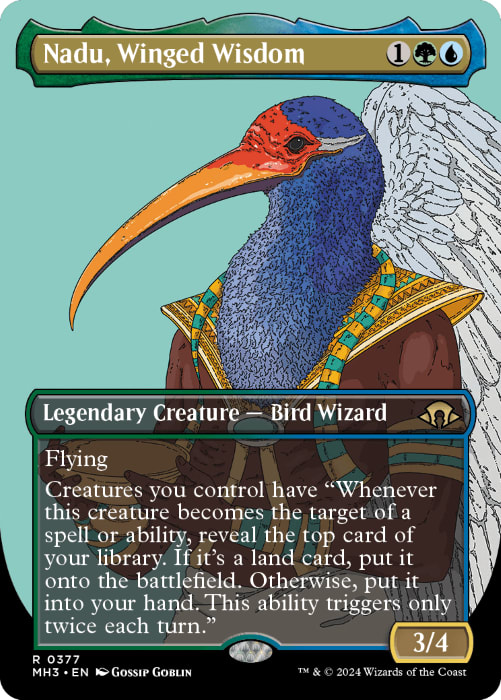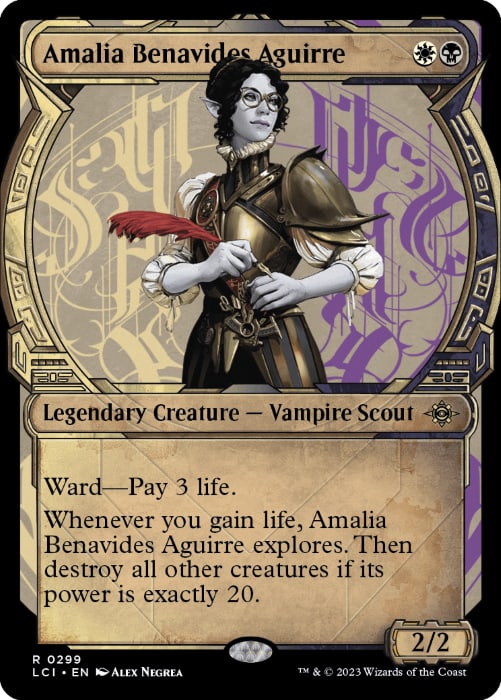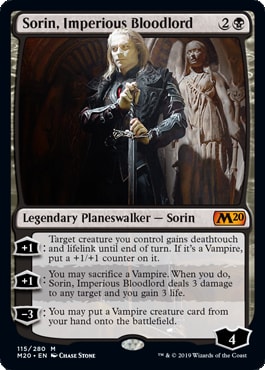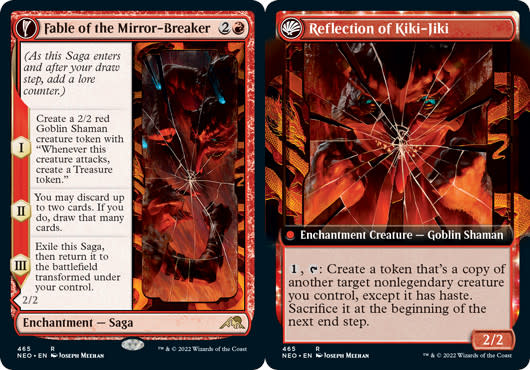This has been a long-awaited ban announcement.
Wizards of the Coast has been toying with their ban windows for some time, trying to find the least obtrusive way to ban cards that allows for fixing of formats that need it without damaging players confidence in buying into a deck or format. This previous ban window was a very awkward one, with an announcement happening right before Pro Tour Modern Horizons 3, and then many weeks later happening this past Monday.
If you watched any of Pro Tour Modern Horizons 3, the issue was pretty clear.
As such, the Modern RCQ season and other big Modern events have languished in a Nadu hellscape for the last month and a half, as everyone knew it was going to be banned, but it was also probably the best way to win whatever event a player was playing in. This of course is just going to create feel bads all around, as either you're buying into a deck that's going to be banned or losing to it, and thankfully we've come out the other side.
But Modern is not the only format being touched today, as "The Big Three" in Pioneer of Izzet Phoenix, Rakdos Vampires, and Amalia Combo have all been proving to be problematic in Pioneer since Pro Tour Murders at Karlov Manor, leaving the format a bit stagnant.
So, let's see where they landed!
Modern
Nadu, Winged Wisdom is banned.
Ah yes, the elephant in the room.
Much of the dismay leading up to this announcement isn't necessarily about the fact that Nadu, Winged Wisdom was printed. Modern Horizons 3 lead designer Michael Majors wrote an companion article to the announcement on Monday explaining that Nadu was simply a last minute design change mistake, much like Skullclamp or Oko, Thief of Crowns. The card was changed last minute, an interaction was missed, and bam, here we are.
It happens.
Magic is infinitely complex, especially the older formats, and frankly it would foolish to think that Wizards of the Coast is going to catch everything. Nadu is clearly broken with Shuko and other zero mana targeting effects, and also clearly belongs on the ban list for it.
Most of the vitriol comes from the fact that everyone knew this after Pro Tour Modern Horizons 3, but Wizards had handcuffed themselves to their ban schedule and decided not to deviate and make an emergency announcement. Was that an error? Perhaps, but the long and short of it is that we're here now and there's no doubt of Nadu's place on the Modern ban list.
Grief is banned.
Grief however is not nearly as clear of a ban as Nadu is.
There's no doubt of Grief's power level. The "scam" effect of using various one mana cards to recur it after evoking on turn one for a double Thoughtseize plus 4/3 menace is not only extremely powerful, but also extremely miserable as well.
It's a very real debate whether or not Grief is oppressive on pure power level alone. Rakdos Scam won Pro Tour Lord of the Rings last year, and even in the shadow of Nadu, Grief was still a major player in a number of decks at Pro Tour Modern Horizons 3. With Nadu now banned, Grief could have very easily reclaimed its place on the top of the metagame.
However, the ban list isn't just about locking up design mistakes and busted combo cards.
Magic is at its core a game, and a game that is meant to be enjoyed. Having a card like Grief be one of the best cards in a format makes the format far less enjoyable to play. Good interaction is fine, but starting a game down two spells and facing down a very fast clock as one of the most common plays in the format makes players not want to play, and that's bad for the game.
I couldn't be happier that Grief is gone, so I say good riddance.
The One Ring is not banned.
Nadu, Winged Wisdom may have been the story of Pro Tour Modern Horizons 3, but it was actually The One Ring which was the most played card in the tournament by a very wide margin. An astounding 46% of players (including me!) registered The One Ring in the Pro Tour, meaning almost half of the field was wielding Sauron's most feared weapon. For context, the next most played card was Phlage, Titan of Fire's Fury in a much more reasonable 35% of decks.
This is a wild statistic that has been mostly overlooked because of the focus on Nadu, Winged Wisdom.
As we've seen many times across various formats, excellent colorless cards are often an issue. From Smuggler's Copter to Umezawa's Jitte to Skullclamp, a card that is generically very powerful and can slot into practically any deck often ends up showing up far too often for comfort. The One Ring is exactly this, providing protection and snowballing card draw in a way that few other cards of any color can.
Yet, The One Ring manages to survive this banlist update unscathed.
Is The One Ring too good for Modern? Perhaps, but it is also possible that a more creative solution may be in order. Outside of Vintage, no card is ever restricted (that is, limited to one copy per deck) for good reason. It is a very messy solution, and only increases the variance and feel bads of one player drawing their one copy while the other doesn't. Restriction is the only way to manage the Vintage ban list and actually allow access to Magic's most storied cards like Black Lotus and Ancestral Recall, but because other formats don't have those outliers it is (correctly) never considered as an alternative to banning.
However... The One Ring's uniqueness, as well as the flavor and function of the card, could create the rare scenario where a restriction in a non-Vintage format may actually be an interesting solution. Most of The One Ring's power is tied up in the decidedly non-flavorful ability to just play another copy and reset your burden, which is both oppressively powerful as well as against the spirit of the Lord of the Rings story. Only being able to play one copy removes this play pattern while still allowing you to play with the card.
In a perfect world, The One Ring would have been printed to give the player the burden counters, not The One Ring itself, but because errata is off the table this could be an intriguing middle ground.
Pioneer
Moving on to Pioneer, we see a reaction to "The Big Three" of Rakdos Vampires, Amalia Combo, and Izzet Phoenix.
Amalia Benavides Aguirre is banned.
Ah yes, Amalia Combo.
Amalia Combo has two big problems in Pioneer.
The first is that, somewhat obviously, it's quite good. It's not exactly Nadu levels of good, where the rest of the format can't really keep up, but it's good at a level that puts a significant amount of pressure on every deck in the format to be able to interact in the proper way by turn three, while also having a sufficient number of countermeasures to interaction. Left unopposed, Amalia Combo will often win on turn three or four, which is very fast for a format like Pioneer, and the deck is able to fight through interaction on a fairly consistent basis.
That's a lot of red flags, but the real kicker is the deck's ability to intentionally (or unintentionally) create boundless loops that cause the game to end in a draw. If either player is able to make Wildgrowth Walker indestructible during the combo, or able to increase Amalia's power above 19 to make her skip her 20 power stopgap, the game goes into an unbounded number of triggers which forces a draw.
We saw this at Pro Tour Murders At Karlov Manor in the semifinals, where Simon Nielsen and Christoffer Larsen had two draws on their way to a six game match.
This awkward interaction, along with all the negatives of such a fast and punishing combo deck that is hostile to many different types of deck that would normally have a chance in the metagame, sees the Amalia ban as an overall good one for Pioneer as a whole. Removing the pressure of Amalia on the format will hopefully open a wider variety of decks in the metagame.
Sorin, Imperious Bloodlord is banned.
Uh, oh crap, did we do that?
When Seth Manfield won Pro Tour Murders At Karlov Manor with the Rakdos Vampires deck our team created and almost all played to the highest win rate at the Pro Tour, it signaled a fundamental change in the Pioneer Metagame. Rakdos Midrange proper had an awful tournament, hovering around a 42% win rate, while Rakdos Vampires had most of the upside that Rakdos Midrange had with a major power boost and the ability to just turn three people, and had a tournament-best 60.2% win rate.
Since then, Rakdos Vampires has evolved, while being the most consistently played deck both on Magic Online as well as at various RCQs and other independent events.
It's been long enough now that something probably had to be done about the deck, and Wizards of the Coast is going right for the throat here by directly removing Sorin, Imperious Bloodlord, and thereby the ability to turn three any busted vampire, from the format.
There's no doubt that this directly removes Vampires from the format while leaving Rakdos Midrange intact, but I do think that Fable of the Mirror-Breaker may have been the card to hit instead. Our testing only really ramped up once we added Fable of the Mirror-Breaker to the Vampires deck, giving in such a powerful plan B in both filtering to find either combo piece, making mana to just hardcast Vein Ripper as needed, and also just being an incredible card in and of itself alongside Bloodtithe Harvester.
Without Fable of the Mirror-Breaker, it is a serious question if Sorin, Imperious Bloodlord and Vein Ripper would be consistent enough to be a major threat, and Fable of the Mirror-Breaker also remains one of the most powerful cards in the format in other decks as well. Don't forget, Izzet Creativity won the prior Pioneer Pro Tour, also playing four Fable of the Mirror-Breaker.
Action may eventually be needed on Fable, but for now removing Sorin is the surefire way to remove Vampires from the metagame.
Treasure Cruise is not banned.
Wait what?
I was astounded that Treasure Cruise was not banned after Pro Tour Murders At Karlov Manor, as while Rakdos Vampires was obviously the breakout deck, Izzet Phoenix put up one of the best showings for a deck that was the most played decks in the tournament in the history of the Pro Tour.
Despite being public enemy number one, the deck everyone expected to be the most played deck in the tournament as well as the deck that everyone in the room was gunning to beat, Izzet Phoenix still posted an almost unheard of 57.5% win rate across the largest sample size of matches in the room. And this is all players playing the deck, not just the established pros or players who made day two.
That number is astounding.
And at its core, Izzet Phoenix is a Treasure Cruise deck through and through. The deck has proved to be incredibly resilient, able to shape itself to whatever the expected metagame is, having great plans against sideboard hate, and being one of the most consistent major tournament decks of all time. There's something incredible about being able to see four or five cards every turn, and then cast Ancestral Recall over and over again.
Treasure Cruise being banned in Pioneer is a "if" not "when" scenario, and chopping the legs out from the other two big decks in the format and not banning Treasure Cruise, the busted card that is banned in every other format, is a wild choice. Hope you own your Arclight Phoenixes! If you want to win in Pioneer in the coming months you better be ready to play Izzet Phoenix or make sure that you can beat it.
Other Formats
There were some changes to other formats as well, with Grief also getting the axe in Legacy where it is even more oppressive alongside Reanimate, Daze, and Force of Will, as well as Urza's Saga and Vexing Bauble being restricted in Vintage, both of which seem completely reasonable but are above my pay grade.
There were also no changes to Standard, which makes sense as the format is as healthy and awesome as it has ever been.
The conclusion here is that it looks like Modern and Pioneer are both in better places today then they were this time last week, although both formats have a broken card draw spell that needs to be watched very closely.
For now Nadu summer is over, so get back out there and start playing again!

































